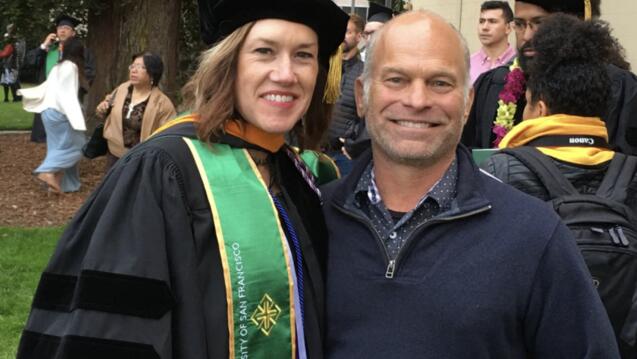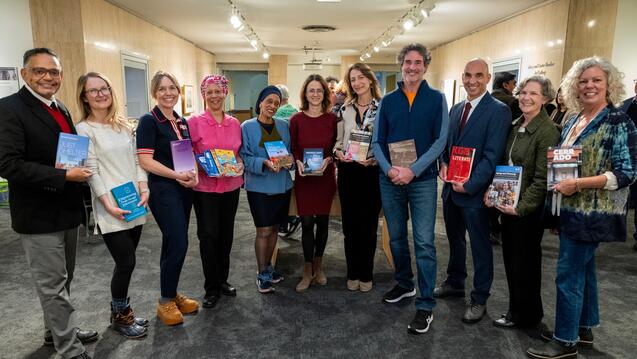Living the Law

On a typical day, USF School of Law Professor Lara Bazelon juggles any number of activities: She directs two of the law school's clinics, teaches a criminal procedure class, is frequently interviewed for newspaper and magazine articles, regularly appears on television news, and writes for both scholarly journals and mainstream publications, including frequent op-eds in The New York Times.
She also was recently granted tenure and promotion to full professor, an accomplishment that recognizes her scholarship, teaching, service, and advocacy. All that she does, Bazelon said, is in pursuit of a fairer criminal justice system.
“I feel really driven to correct what I see as gross injustices in the criminal justice system and school disciplinary proceedings,” Bazelon said. “It is a racist system and a system that discriminates against poor people. I want to do everything I can to make my small contribution to changing it. That’s what motivates me in what cases I take, what I write about, what I talk with students about, and what I strategize about. It’s what gets me up in the mornings.”
In recommending Bazelon for tenure, Interim Dean Susan Freiwald pointed to Bazelon’s talent, drive, and energy. “Professor Bazelon has enthusiastically served the law school and university community, providing invaluable student training, positively impacting the lives of the clinic’s clients, and improving the law through litigation, policy work, writings, and presentations,” Freiwald said. “Professor Bazelon’s passion for criminal justice reform drives her innovative and exhaustive research and inspires her to publish books, law review articles, persuasive writings in the mainstream media, and reform proposals for criminal justice professionals.”
The clinics embody USF’s mission. We believe in helping the people who are discarded, despised, discriminated against, impoverished, and voiceless.
As director of the Criminal and Juvenile Justice Law Clinic and the Racial Justice Clinic, Bazelon each semester oversees approximately 10 law students between the two clinics. Bazelon serves as the supervising attorney for students as they gain litigation experience in the clinics, handling assignments as varied as appearing and speaking for prisoners at San Quentin in parole hearings, to representing clients facing misdemeanor charges, to advocating for students facing expulsion during campus disciplinary proceedings.
Directing these two clinics perfectly combines her interest in continuing to represent clients with her desire to teach students how to become “effective, zealous advocates when they graduate,” said Bazelon, who for seven years served as a trial attorney in the Office of the Federal Public Defender in Los Angeles. It also provides her with an opportunity to pursue research. Much of her scholarship has focused on the intersection of ethics and criminal justice advocacy, with a specific focus on what it means to be an ethical prosecutor and an ethical judge.
Bazelon’s writing extends beyond scholarly journals; she also is a frequent contributor to mainstream publications including Slate, the New York Times, and the Atlantic, and is regularly quoted in local and national media. Her media work, she said, is an important way of raising public awareness.
“It’s really important for people who litigate in this space to educate the public about what the issues are,” Bazelon said. “That is how we make political change. I think it’s an obligation we have to try and share our knowledge and experience to explain to people why we believe certain practices and policies are wrong and why certain reforms are necessary.”
It’s really important for people who litigate in this space to educate the public about what the issues are.
Before joining USF, Bazelon served as a visiting associate clinical professor at Loyola Law School and the director of the Loyola Law School Project for the Innocent and later as a teaching fellow at UC Hastings College of the Law.
Bazelon had long been impressed with USF’s partnership with the San Francisco Public Defender’s office — the clinic takes cases directly from the defender’s office and litigates them independently — and with the university’s commitment to its mission, including supporting new projects undertaken by the clinics.
“The clinics embody USF’s mission,” Bazelon said. “We believe in helping the people who are discarded, despised, discriminated against, impoverished, and voiceless. That is the core mission of the university and the clinics carry that out every day. We represent people who might not otherwise have anyone who is able to stand up for them.”


